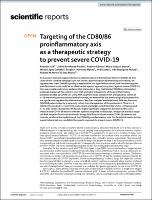Targeting of the CD80/86 proinflammatory axis as a therapeutic strategy to prevent severe COVID-19

Author
Date
2021-06-01Permanent link
https://hdl.handle.net/11351/6803DOI
10.1038/s41598-021-90797-0
ISSN
2045-2322
WOS
000660845500005
PMID
34075090
Abstract
An excessive immune response known as cytokine storm is the hallmark of severe COVID-19. The cause of this cytokine rampage is yet not known. Based on recent epidemiological evidence, we hypothesized that CD80/86 signaling is essential for this hyperinflammation, and that blocking this proinflammatory axis could be an effective therapeutic approach to protect against severe COVID-19. Here we provide exploratory evidence that abatacept, a drug that blocks CD80/86 co-stimulation, produces changes at the systemic level that are highly antagonistic of the proinflammatory processes elicited by COVID-19. Using RNA-seq from blood samples from a longitudinal cohort of n = 38 rheumatic patients treated with abatacept, we determined the immunological processes that are significantly regulated by this treatment. We then analyzed available blood RNA-seq from two COVID19 patient cohorts, a very early cohort from the epicenter of the pandemic in China (n = 3 COVID-19 cases and n = 3 controls), and a recent and larger cohort from the USA (n = 49 severe and n = 51 mild COVD-19 patients). We found a highly significant antagonism between SARS-CoV-2 infection and COVID-19 severity with the systemic response to abatacept. Analysis of previous single-cell RNA-seq data from bronchoalveolar lavage fluid from mild and severe COVID-19 patients and controls, reinforce the implication of the CD80/86 proinflammatory axis. Our functional results further support abatacept as a candidate therapeutic approach to prevent severe COVID-19.
Keywords
Coronavirus SARS-CoV-2; COVID-19; 2019-nCoV; Inflammatory diseases; Target identification; Viral infectionBibliographic citation
Julià A, Bonafonte-Pardàs I, Gómez A, López-Lasanta M, López-Corbeto M, Martínez-Mateu SH, et al. Targeting of the CD80/86 proinflammatory axis as a therapeutic strategy to prevent severe COVID-19. Sci Rep. 2021 Jun 1;11:11462.
Audience
Professionals
This item appears in following collections
- Col·lecció especial COVID-19 [945]
- VHIR - Articles científics [1751]
The following license files are associated with this item:

 Private area
Private area Contact Us
Contact Us







